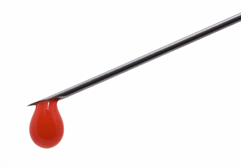It is now 9 months or so since a Northern Ireland hospital worker who suffered a sharps injury while handling a bag of clinical waste and feared life-threatening infection will be awarded £3,000 compensation. Court of Appeal judges said he should receive the damages.
Following the incident, he developed an adjustment disorder over anxieties that he may have been exposed to grave risks and received counselling. In the original compensation case, a High Court judge held that penetration of  skin by the needle was just a trivial injury; it was found to be an exposure to risk and no more. But the Court of Appeal ruled it was wrong to decide the injury was so trivial it could not lead to damages. Lord Justice Girvan said: “As has been frequently said in many situations, context is everything. “The plaintiff was injured by a non-sterile needle in a bag of hospital waste and it may well have been contaminated by blood-borne organisms liable to cause serious infection.”
skin by the needle was just a trivial injury; it was found to be an exposure to risk and no more. But the Court of Appeal ruled it was wrong to decide the injury was so trivial it could not lead to damages. Lord Justice Girvan said: “As has been frequently said in many situations, context is everything. “The plaintiff was injured by a non-sterile needle in a bag of hospital waste and it may well have been contaminated by blood-borne organisms liable to cause serious infection.”
We should all welcome this important Appeal Court decision though it sseems already that it is being overlooked. The psychological impact of sharps injury may predispose to severe stress/anxiety conditions and disabling post-injury morbidity that may adversely affect the lives of those suffering injury and of their partner or family group, and may force job change or result in an inability to work. Perhaps now the real impact of sharps injury will be acknowledged.
This should prompt also a review of the Reporting of Injuries, Diseases and Dangerous Occurrences Regulations 1995 (RIDDOR) that effectively exclude sharps injuries from mandatory reporting, defeating the collection of national incidence statistics and failing to enforce protection using the full weight of Health & Safety legislation. Recent changes to RIDDOR weaker the legislation still further, to become something of a lame duck tool that is so managed to avoid additional workload for a hugely underfunded HSE. But it is only through effective central reporting and follow-up of incidents that the true scale of this problem will become known.
